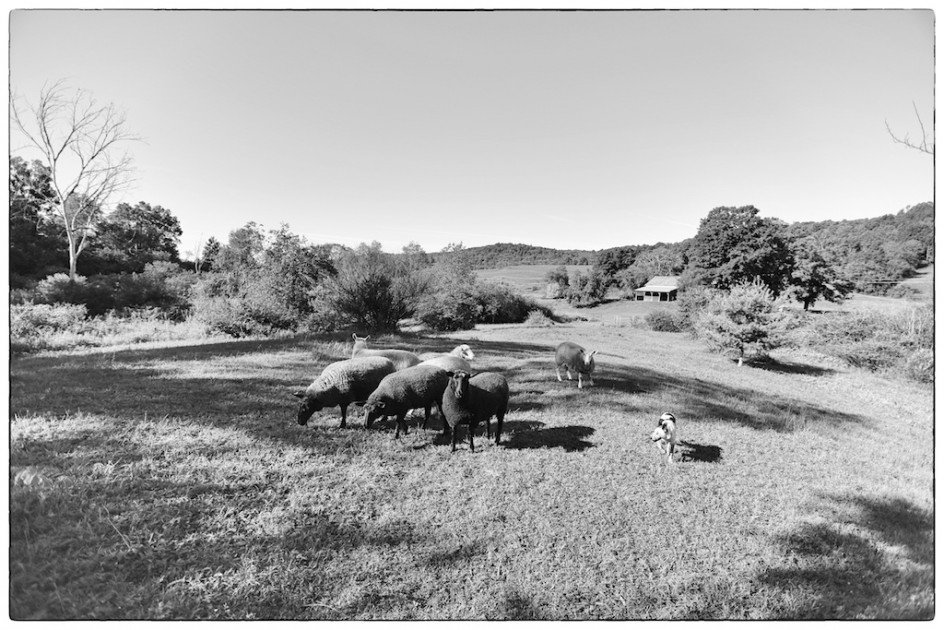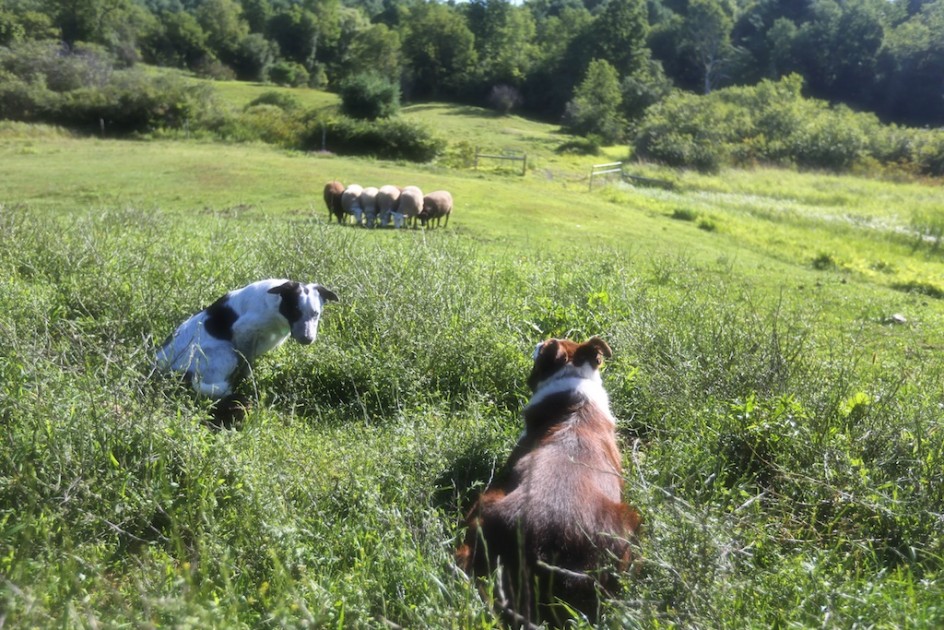
Jenna Woginrich is a neighbor, also a young and manically productive fellow writer, homesteader, and blogger.
She is also many other self-described things – a fiddler, vegetable grower, animal lover, survivalist, cheese and soap maker, draft horse lover, goat milker, butcher, horsewoman, web designer, archer, martial arts practitioner. Jenna and I have an odd relationship, we seem to respect and appreciate one another, but our friendship has been uneasy.
Because we both live on farms and love them, many people think we are just alike.
In some ways we are much alike, in many ways we are very different. We rarely see one another, even though she lives just over the hill.
This week, Jenna, who has used technology to help her survive for some years now, launched a worthy and interesting experiment in the new sharing world.
She needs to buy a new truck, her old one is falling apart, and she went on her blog and and asked for help in buying a 1989 Ford f150, it was, she said, her dream truck. Jenna is like that, whatever she wants is the best thing in the world to have, the dream of a lifetime.
She is a skilled marketer, and she is motivated: she is marketing her life. I am also marketing mine.
Jenna has given the truck a female gender and told her readers “I don’t have the money for her. That’s where you guys come in. I am asking for help with this loan, which to be funded requires that fifteen people loan me $25 a piece for it to qualify. Note – this is a LOAN,” she wrote, “not a Kickstarter or crowd funding. You get your money paid back to you, automatically deposited back into your account as I make the small monthly payments…”
There are lots of people in the world – I am sometimes one of them – who believes you cannot have a life you can not afford to pay for. That has always been one of the great truths of life I have been taught by my elders. I have also learned this lesson the hard way, I was living a life I suddenly couldn’t pay for, and I will be dealing with the consequences for a long time.
But life is never black and white for me, as it is for all of the Outrage Addicts who live on social media. Jenna is paying for her life, she is just doing it in a very new and different way.
I am seeing the old values of the world upended, and good riddance to many of them. If you watch the news and are awake, you know we desperately need new values. So many people hate their work and hate their lives.
Jenna encourages her readers to buy a farm, any way they can, as soon as they can. I don’t. Farms are not nearly for everyone, and Jenna has shared many truths and hardships about her farm on her blog. She has many passionately devoted followers, and like the rest of us who share our lives, a good number of critics. She and I live differently, we have very different ways of living with animals.
Some of Jenna’s followers responded warmly and enthusiastically to her call for help. One – her named was Ginger – sent her a message which Jenna posted: “I live on a fixed income and pinch and budget and do without if I can’t afford it. Maybe you could take a part-time job or do without instead of asking for a series of loans from people you don’t even know. If this farm thing isn’t working you, you may need to make a change.”
I am familiar with messages like this, I don’t care for them. Sharing one’s life does not mean giving it away to people who think e-mail and Facebook give them the right to tell other people what to do, and to punish honesty with cruelty and judgement. If Jenna is making mistakes, she will pay for them learn from them. No one is forcing anyone to help her. If they wish to do it, that is their business.
Jenna responded to this message – this issue has come up with her several times before – at some length on her blog, and I thought the exchange was interesting, a powerful reflection of how the world is changing, of the implications of the new sharing economy, and the new sharing world. For older people raised in the traditional ideas about money and responsibility, Jenna is living out of reality. For many younger people, the sharing world is the new reality.
You cannot, the idea goes, expect other people to pay for your life. It was what almost every parent has taught every child for generations. It is the foundation of the capitalist economy.
Jenna argues for sustainability and independence, but her problem is that her farm is not sustainable as a farm, nor is she really independent. Is it okay to live a life others must help you to pay for? How dependent on others can we be and still claim we are free?
The sharing economy takes many forms, it uses information technology to give individuals a means of sharing resources, experiences or services. The ride-sharing company Uber is perhaps the most famous example of the new sharing economy, it connects people who need rides with people who wish to give them in ways that eliminate traditional forms of regulation and business. The sharing economy encompasses the following: swapping, exchanging, purchasing, collaborative consumption, trading, peer-to-peer, lending, micro-financing, cradle-to-cradle, open source, open data, user generated content.
I liked one definition offered by Benita Matofska, who publishes a blog about the sharing economy. “The Sharing Economy,” he says, “is a socio-economic ecosystem built around the sharing of human and physical resources. It includes the shared creation, production, distribution, trade and consumption of goods and services by different people and organizations.”
Jenna loves her life, and has broken away from the corporate life that has suffocated the spirits of so many people. But is it the responsibility of other people to pay for it?
Jenna is unapologetic, even defiant, about her life or her choices. Speaking only for myself. Jenna’s request seems reasonable and honest and appropriate to me. I hope she gets her truck. Why is borrowing money from readers any less responsible than getting it from a bank? Or parents? Or friends? She has stated her need honestly. It is up to her readers to decide if they wish to support it or not.
Ginger has missed the point.
Jenna does have a job, and she works hard at it. Her job is to write about her life in a way that interests people. Many people find her story valuable and inspiration, they are eager to cheer on and pay her for her work in a variety of ways – clicking on ads, subscriptions, contributions and donations, attending workshops, paying for private visits, buying things she wants to sell, and offering outright gifts. They seem to relish responding to need. The more struggle there is, the more devoted and admiring they are. There are lessons in that.
In asking for help with her truck, Jenna is not using drama to get people to help her, or claiming to be desperate. To me, that would be a manipulative way to get money from people who usually have less than I do. But she is not using drama, she is not desperate, she is being quite straightforward: she needs a truck and she is asking people to loan her small amounts of money so she can get it and live her life. And she will pay them back.
Jenna is an individual, fighting for the life of an individual, and in the Corporate Nation, where so many young people have become enslaved by debt and by the corporate idea of security, money and obligation, that is a sacred thing to me.
I should say I have turned to crowdsourcing for help, once for me and for others. I would not be comfortable asking my readers to loan me money. That is not the relationship I seek from them, I would want more distance. I don’t ever want to test my editorial independence by being in debt to the people who read me. That would get into my head. People subscribe to my blog, but that is payment for my work, not my need. I love knowing I can write what I want, no matter what.
If it came to that, I would probably give the farm up, that is just me, it does not mean it is wrong for anyone else to do it.
I asked people on Kickstarter last year to help me buy a new camera for my pictures and for a book on animals I was working on. And they did. Publishers don’t pay for that sort of thing any longer, and writers can’t afford it any longer, even best-selling writers. I helped with several other successful Kickstarter projects for other people. They were successful. The sharing economy is helping many people, connecting millions directly to one another, and transforming our very idea of what a business is. We live in a new time.
Is my request for help any nobler than hers? Of course not. Everyone has a harder life than I do.
Jenna’s contract is with her readers, not a bank or a corporation. It is between them. People can decide for themselves, that is the power of the sharing eco-system. It is a precious value for people to lead lives of passion and creativity and independence. That is good and hard work, and up here, it needs a good and hardy truck. If you are so inclined, you can help Jenna here.




